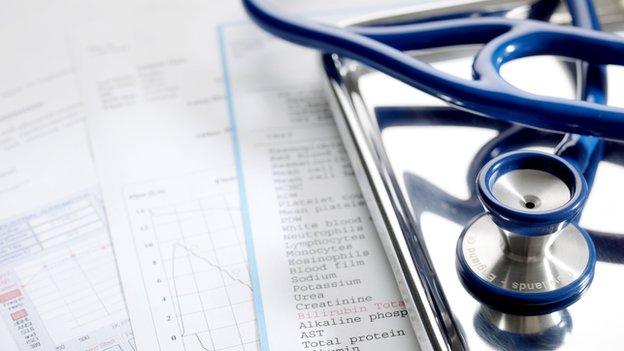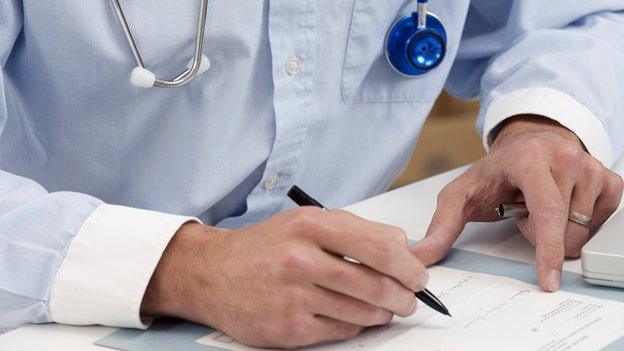The battle over GP opening
- Published
- comments

GPs are often referred to as the gateway to NHS care. It is easy to understand why - nine in every 10 patient contacts are at GP surgeries.
So it should come as no surprise that the state of services should be providing such an important battleground between the political parties in England.
Labour has already signalled its intention to make GP care a focus of the election campaign by promising to bring back the 48-hour target for appointments, which was scrapped in 2010.
The coalition government has taken a slightly different tack. Last year pilots were announced to extend GP opening into weekends and evenings and improve access via technologies such as skype and email.
A total of 1,100 practices have subsequently signed up - one in eight - although only just over a quarter of those have actually got new projects up-and-running currently.
Nonetheless, the Conservatives have been so impressed by the success of the schemes that they now want to extend them and provide everyone with access to GP services seven days a week by 2020.
But is this even needed? First of all, it is important to establish what is actually being proposed.
Seven-day access does not mean every GP surgery being open. Instead, what has happened in the pilots that have got under way is that surgeries have grouped together to share the responsibility with different practices taking it in turns to open.
This has allowed the money that has been made available - £50m so far and a total of £400m promised to achieve the seven-day vision - to stretch so far.
The funding, which is being taken from Department of Health budgets rather than the allocation to the NHS, is solely for set-up costs, such as ensuring medical records can be shared between practices.
'Relentless pressure'
GPs are being asked to cover the on-going costs of providing improved access from their existing budgets - and this is where the problem lies, according to the profession.
Both the Royal College of GPs and British Medical Association have highlighted figures showing that the amount spent on practices has fallen by £400m in real terms to £8.5bn over the three years to 2012-13.
That has happened at a time when the number of consultations being carried out has been rising - up by 40m since 2008 to 340m on last count.

Unsurprisingly, the combination of these factors seem to have started taking their toll. According to the latest official GP patient survey, external published in the summer, the proportion of patients finding it difficult to get through to their GP surgery on the phone rose from 18% to 24% over the last two years.
When they did get through 11% were unable to get an appointment, while 8% of those who did get one felt it was at an inconvenient time.
Dr Chaand Nagpaul, of the British Medical Association, describes the pressures as "relentless" and claims services have reached a "critical juncture".
The union wants to see an increase in investment in general practice and extra doctors taken on.
Ministers have already announced an extra 5,000 GPs are being trained, while Labour last week said it would recruit an extra 8,000. Both are significant rises on the 36,000 currently in post.
But even if the numbers are increased, is seven-day opening the right initiative to invest them in?
After all, GPs are available via out-of-hours services and - sometimes - in walk-in centres.
Nonetheless, it sounds good on paper. But history suggests there is a limit to how useful it is.
The last Labour government encouraged practices to open longer - late into the evenings and at the weekends.
But the demand was not always there and funding ended up being cut and in some places the longer opening hours were reversed.
The reason is simple - as one GP put it to me recently. "Longer opening is a fine idea, but the problem is that the people who see us the most - young children and the elderly - are the ones that don't have a problem with appointments on a Monday afternoon."